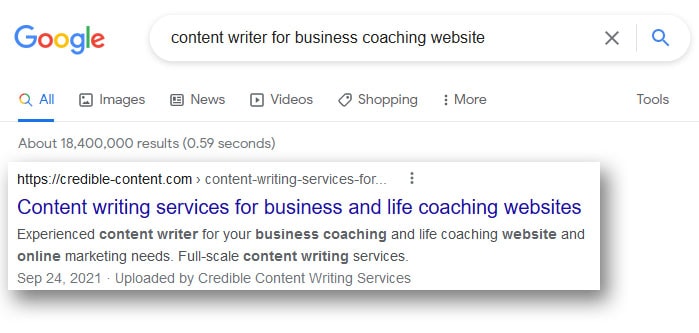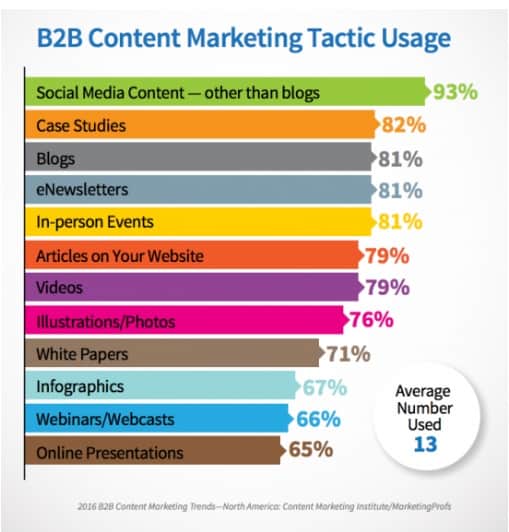When it comes to building a strong brand and brand positioning, content writing plays a crucial role.
Content writing is all about creating valuable and engaging content that resonates with your target audience.
By crafting compelling stories and messages, you can effectively communicate your brand’s unique value proposition and position it in the minds of your customers.
Through content writing, you have the power to shape how people perceive your brand and differentiate it from competitors.
What is brand positioning and how is it achieved through content writing?
Take for example Nike. It is a well-known brand in the sports industry (mostly known for selling shoes).
Everybody knows “Just Do It”. This phrase, through content writing, inspires and motivates individuals to push their limits, overcome obstacles, and achieve their goals.
This is their brand positioning.
Although they are selling shoes, they don’t want you to buy their shoes just for wearing them. They want you to buy their shoes to excel in life. This is their brand positioning.
Nike constantly reinforces the empowering narrative through telling stories of real athletes who have faced challenges and triumphed. This is achieved through content writing and other media.
When you think of Nike you think of a brand that has positioned itself as someone who stands for athleticism, perseverance, and personal growth.
Whether the right content for blogs, video scripts, or social media campaigns, their content writing strategy reinforces their brand position and strengthens the relationship with the target audience.
Another company that is quite famous for its brand positioning is Apple.
Apple is known for its slick designs and user-friendly interfaces whether it produces iPhones or iPads, or other gadgetry.
Through their content writing, Apple consistently focuses on highlighting the seamless integration of the products and the exceptional user experience they offer.
The content consistently emphasises the power of the technology to enhance and simplify everyday life.
There positioned their brand as a company that offers cutting-edge technology with a touch of luxury. Yes, this is expensive gadgets but the target audience knows that it gives the values it pays for.
Through content writing, they create the overall perception of a brand that sets trends and delivers products that seamlessly blends style and functionality.
Similarly, Google has positioned its brand as the go-to search engine to such an extent that “googling” has become an action word.
When your business is known for something, when it instantly evokes an emotion that is consistent, it has achieved it through strategic brand positioning.
Why is brand positioning important?
There are different mobile phones. There are 10 major mobile phone brands in the US. Through clever brand positioning, Apple has gained 57.75% market share in the US.
Somehow Apple has convinced people that owning an iPhone increases their prestige. This is brand positioning.
There are different beverages. According to 2021 figures, Coca-Cola had a market share of 46.3% in the US while Pepsi had a market share of 25.6%.
People like Coca-Cola taste. They want to be seen drinking Coca-Cola. This is brand positioning.
Here are a few reasons why brand positioning is important to your business.
Differentiation
- It helps your brand stand out from competitors.
- It creates a unique identity and personality for your brand.
Targeting
- It enables you to focus on specific customer segments.
- It helps you tailor your marketing efforts to reach the right audience.
Competitive Advantage
- It gives your brand an edge over competitors in the market.
- It highlights the unique value your brand offers to customers.
Clarity
- It provides a clear and consistent message about your brand.
- It helps customers understand what your brand represents.
Customer Loyalty
- It builds trust and emotional connection with customers.
- It encourages repeat purchases and long-term relationships.
Pricing Power
- It allows you to command premium prices for your products or services.
- It positions your brand as a high-quality and desirable option.
Brand Equity
- It enhances the overall value of your brand.
- It increases customer perception and preference for your brand.
Communication
- It facilitates effective communication with customers.
- It ensures your brand message resonates with the intended audience.
Consistency
- It helps maintain a consistent brand image across different touchpoints.
- It ensures that your brand remains recognizable and memorable.
Business Growth
- It drives business growth and market share expansion.
- It attracts new customers and creates opportunities for expansion.
Imagine you’re at a store, surrounded by countless products.
Suddenly, you come across one that immediately triggers something within you.
You feel a sense of familiarity, a sense of trust, and you know it’s the one you’ve been looking for. That’s the power of brand positioning.
By crafting a unique identity and showcasing the value your product brings, you’re not just selling a physical item, you’re forging a lasting connection that sets you apart from the competition.
Strategic Content Writing for Effective Brand Positioning
Understand Your Target Audience
- You need to understand your target audience to create compelling content writing.
- Research their demographics, preferences, and pain points to tailor your brand positioning.
- Get insights through customer surveys and social media analytics for effective content writing.
- By understanding your audience, you can align your brand positioning through content writing.
Define Your Unique Selling Proposition (USP)
- Discover and define your Unique Selling Proposition (USP) for effective brand positioning.
- Highlight the key features, benefits, or qualities that make your brand unique in your content writing.
- Communicate your USP clearly to showcase your brand’s value through content writing.
- Your USP plays a pivotal role in content writing for effective brand positioning.
Craft Engaging Brand Stories
- Engage your audience by telling compelling stories about your brand.
- Share your brand’s journey, vision, values, and mission in a relatable manner through content writing.
- Connect with your audience emotionally and make your brand memorable in your content writing.
- Incorporate personal experiences or testimonials to add authenticity to your brand positioning.
Consistency in Brand Messaging
- Maintain consistency in your brand messaging across all content writing efforts.
- Develop a brand voice and tone that resonates with your target audience.
- Ensure consistent messaging in your content writing to reinforce your brand positioning.
- Consistency in brand messaging is crucial for effective content writing and brand positioning.
Conduct Keyword Research and SEO Optimization
- Conduct keyword research to understand the language your target audience uses in content writing.
- Incorporate relevant keywords naturally throughout your content writing for improved SEO.
- Optimize meta tags, headings, and descriptions to enhance your brand’s visibility in content writing.
- Strategic keyword usage in content writing contributes to effective brand positioning.
Leverage Various Content Formats and Channels
- Experiment with different content formats, such as blog posts, videos, infographics, and podcasts.
- Tailor your content to different channels, including websites, social media, and emails, for effective brand positioning.
- Explore diverse mediums to reach and engage a wider audience through content writing.
- Utilize content writing to repurpose and republish your valuable content across different channels.
Enhance Content with Visuals and Multimedia
- Use visually appealing images, videos, and graphics to enhance your content writing.
- Incorporate infographics or charts to simplify complex information for your audience.
- Create interactive multimedia content that encourages engagement and sharing in your content writing.
- Visuals and multimedia amplify the impact of your content writing on brand positioning.
Provide Valuable and Actionable Information
- Deliver valuable insights, tips, or industry knowledge through your content writing.
- Empower your audience with actionable steps they can take from your content writing.
- Position yourself as a reliable source of information in your content writing for effective brand positioning.
- Valuable and actionable content writing establishes your expertise and strengthens your brand positioning.
Encourage Audience Interaction
- Encourage audience interaction through comments, shares, and likes in your content writing.
- Prompt conversations, ask questions, and seek opinions in your content writing to engage your audience.
- Respond promptly to audience comments and messages to foster a sense of community.
- Content writing that encourages audience interaction strengthens your brand positioning.
Personalize the Content Experience
- Tailor your content writing to cater to the specific needs and preferences of your audience.
- Use a conversational style, addressing the audience directly as “you” in your content writing.
- Offer personalized recommendations or solutions to your audience’s challenges in your content writing.
- Personalized content writing establishes a strong connection and reinforces brand positioning.
Leverage Social Proof and Testimonials
- Showcase social proof such as testimonials, reviews, and case studies in your content writing.
- Highlight positive feedback and experiences from satisfied customers through content writing.
- Incorporate user-generated content to demonstrate the impact of your brand in your content writing.
- Social proof and testimonials enhance your brand positioning through content writing.
Monitor and Analyze Performance
- Continuously monitor and analyze the performance of your content writing efforts.
- Utilize analytics tools to track engagement, conversion rates, and other metrics.
- Identify top-performing content and replicate successful strategies in your content writing.
- Data-driven decision-making based on performance analysis improves brand positioning through content writing.
Collaborate with Influencers
- Collaborate with influencers to expand your brand’s reach through content writing.
- Engage influencers in guest posts, sponsored content, or social media collaborations.
- Partner with complementary brands for co-marketing initiatives in your content writing.
- Collaborating with influencers strengthens your brand positioning in content writing.
Embrace Continuous Learning and Adaptation
- Stay updated with industry trends and incorporate them into your content writing.
- Invest in continuous learning to improve your content writing skills.
- Adapt your content writing strategy based on audience feedback and changing preferences.
- Continuous learning and adaptation contribute to effective brand positioning through content writing.
By implementing these strategic content writing tips, you can enhance your brand positioning and create a strong connection with your target audience.
The following will strengthen your brand positioning:
- Understand your audience.
- Define your USP.
- Craft engaging brand stories.
- Maintain consistency in brand messaging.
- Conduct keyword research for writing content.
- Leverage content formats and channels.
- Enhance your content writing with visuals.
- Provide valuable information consistently.
- Encourage audience interaction.
- Personalize the content experience.
- Leverage social proof.
- Monitor performance.
- Collaborate with influencers.
- Embrace continuous learning.
Do you need personal brand positioning?
Personal brand positioning refers to how you present yourself to the world, showcasing your unique qualities, expertise, and value.
It’s about crafting a distinct image and reputation that sets you apart from others.
Just like a business brand, you have your own story, personality, and skills that make you special.
Personal brand positioning is all about leveraging those strengths and communicating them effectively to others.
Listed below are some benefits of personal brand positioning
- Establishes you as an authority in your industry through effective brand positioning.
- Differentiates you from competitors in the crowded marketplace.
- Builds trust and credibility among your target audience.
- Attracts new opportunities and partnerships through strategic brand positioning.
- Increases visibility and recognition for your personal brand.
- Helps you connect with like-minded individuals and build a strong network.
- Boosts your professional reputation and opens doors to career advancements.
- Allows you to command higher rates and fees for your services.
- Increases your influence and impact within your industry.
- Enables you to attract loyal followers and a dedicated audience.
- Positions you as a go-to resource for valuable content and insights.
- Provides a platform to share your expertise and educate others.
- Supports personal and professional growth through continuous content writing.
- Facilitates personal branding partnerships and collaborations.
- Sets the stage for future personal and professional opportunities.
- Enhances your overall brand positioning strategy and long-term success.
Improving Personal Brand Positioning Through Strategic Content Writing
Know Your Target Audience
- Understand who your target audience is and what they’re looking for.
- Research their needs, pain points, and preferences to tailor your content writing.
- Use language and messaging that resonates with your audience’s interests and values.
- Continuously listen to and engage with your audience to strengthen your brand positioning.
Define Your Unique Voice
- Develop a distinctive voice and tone that sets you apart in your content writing.
- Infuse your personality into your writing to create a memorable brand positioning.
- Be authentic and genuine, allowing your true self to shine through your content writing.
- Consistently apply your unique voice across different platforms and content formats.
Share Your Personal Story
- Connect with your audience on a deeper level by sharing your personal brand story.
- Emphasize your journey, experiences, and lessons learned in your content writing.
- Show vulnerability and authenticity to build trust and establish a relatable brand positioning.
- Highlight how your story aligns with your audience’s aspirations and challenges.
Showcase Your Expertise
- Demonstrate your expertise and knowledge in your content writing.
- Provide valuable insights, tips, and solutions that showcase your competence.
- Position yourself as a trusted resource and authority in your field through content writing.
- Consistently share relevant and up-to-date information to reinforce your brand positioning.
Consistency is Key
- Maintain consistency in your brand messaging and content writing style.
- Ensure your brand positioning is reflected consistently across all platforms and channels.
- Stick to a regular content schedule to keep your audience engaged and informed.
- Build familiarity and trust by consistently delivering high-quality content.
Optimize for SEO
- Conduct keyword research to understand the language used by your target audience.
- Incorporate relevant keywords naturally throughout your content writing.
- Optimize meta tags, headings, and descriptions for improved search engine visibility.
- Focus on creating valuable and informative content that aligns with SEO best practices.
Diversify Your Content Formats
- Experiment with various content formats to cater to different audience preferences.
- Explore written articles, videos, podcasts, infographics, and more in your content writing.
- Repurpose your content to maximize its reach and impact across different platforms.
- Adapt your content to suit the strengths and characteristics of each format.
Engage and Interact
- Foster engagement with your audience through your content writing.
- Encourage comments, questions, and discussions to create a sense of community.
- Respond promptly and authentically to audience interactions to build relationships.
- Leverage social media platforms to actively engage and connect with your audience.
Collaborate and Network
- Seek opportunities to collaborate with other influencers and professionals in your field.
- Guest post, participate in interviews, or co-create content to expand your brand positioning.
- Attend industry events and engage in networking activities to build valuable connections.
- Leverage the power of collaboration to amplify your reach and impact.
Personalize the Experience
- Tailor your content to address the specific needs and interests of your audience.
- Use inclusive language and address your audience directly in your content writing.
- Offer personalized recommendations, solutions, or insights to strengthen brand positioning.
- Show that you genuinely care about your audience’s individual journeys and challenges.
Be Consistently Visible
- Maintain an active presence on relevant social media platforms.
- Share your content regularly and engage with your audience consistently.
- Participate in industry discussions, forums, and online communities to boost visibility.
- Strengthen brand positioning by being consistently visible and accessible.
Analyze and Adapt
- Monitor the performance of your content using analytics tools and data.
- Identify trends, patterns, and audience preferences to refine your content writing.
- Continuously adapt your content strategy based on audience feedback and insights.
- Stay updated with industry trends and adapt your brand positioning accordingly.
Seek Feedback and Learn
- Be open to feedback and suggestions from your audience and peers.
- Actively seek constructive criticism to improve your content writing and brand positioning.
- Learn from both successes and failures, using them as opportunities for growth.
- Embrace a growth mindset and continuously seek ways to enhance your personal brand.
Stay True to Yourself
- Authenticity is crucial for effective brand positioning through content writing.
- Stay true to your values, beliefs, and personality in your content writing.
- Avoid trying to be someone you’re not, as it undermines your brand positioning.
- Embrace your uniqueness and let it shine through your content.
Evolve and Innovate
- Embrace change and stay ahead of industry trends and shifts.
- Innovate in your content writing to offer unique and valuable perspectives.
- Continuously evolve your brand positioning to remain relevant and captivating.
- Embrace new technologies, content formats, and strategies to stand out.
By implementing these strategic content writing tips, you can improve your personal brand positioning effectively.




















